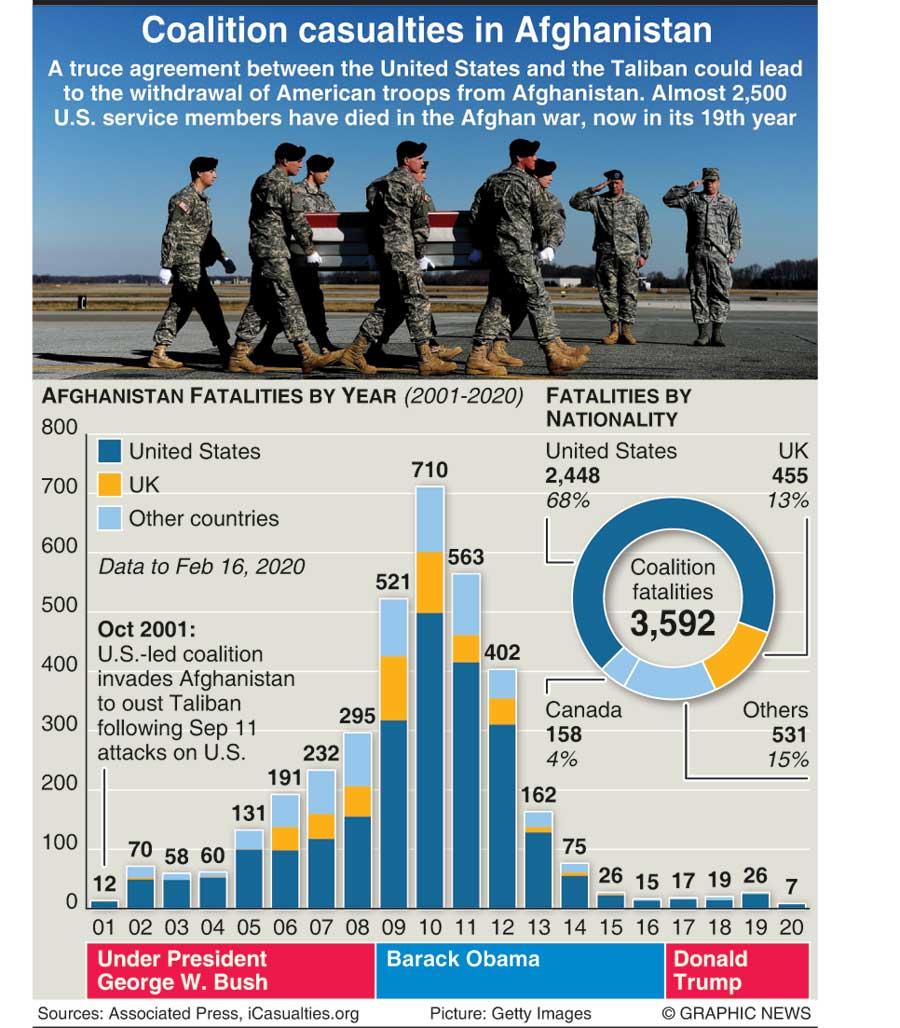Reply To:
Name - Reply Comment
Last Updated : 2024-04-24 06:20:00
Last Saturday, a significant world event took place in the Qatari capital of Doha. Shaking hands and exchanging documents were the United States’ special envoy and a senior Taliban  leader. Long-time enemies, they had just signed an agreement that will eventually end the United States longest war, which started in October 2001, weeks after the US came under an attack carried out by Al-Qaeda on September 11, 2001.
leader. Long-time enemies, they had just signed an agreement that will eventually end the United States longest war, which started in October 2001, weeks after the US came under an attack carried out by Al-Qaeda on September 11, 2001.
The casus belli for the US invasion of Afghanistan was that the then Taliban rulers rejected the US request to hand over Al-Qaeda leader Osama bin Laden, a guest of the Taliban. The Taliban fled Kabul to the countryside bordering Pakistan when the US unleashed its heavy weapons on Taliban targets. he US ground troops advanced from northern Afghanistan together with the Northern Alliance, an Afghan Mujahideen group opposed to the Taliban.
The US was riding on the world’s sympathy following the deaths of about 3,000 people in the 9/11 terror attacks on the World Trade Centre towers in New York and the Pentagon in Washington DC. With most nations extending their support for the US war, which the then US President George W. Bush touted as an all-out war on terror, the US did not care a damn about human rights, international humanitarian laws, and the laws of war. More than 3,500 innocent Afghan civilians perished in the first few days or weeks of the US attack codenamed Operation Enduring Freedom.
Hundreds, if not thousands, of Afghans and al-Qaeda members were taken prisoner. Among them were civilians, too. But the Geneva Convention on Prisoners of War did not apply to them. In one instance, in the Afghan city of Mazar e Sahrif, 400 prisoners died in the coalition attack led by the US and Britain. Blindfolded, gagged and ears plugged prisoners in orange jumpsuits were airlifted to the US base in Guantanamo Bay in Cuba. They were subjected to waterboarding, psychological and other types of torture. The UN torture convention was deliberately disregarded, as though the US, the then sole superpower, was making a public statement that all these human rights pacts did not apply to the mighty. The International Committee of the Red Cross was denied access to the prisoners. In Kabul, a puppet regime was established with a façade of democracy. The war was conducted on the basis of all’s fair in terror war.
That was how the war began and proceeded for nearly two decades, during which 2,400 US troops were killed and some 24,000 wounded. The money the US dumped into this war was a staggering $2 trillion dollars or $105 billion a year – $75 billion more than the $30 billion the UN wants for a year to end world hunger.
It is estimated that some 360,000 Afghan civilians have perished in the conflict or due to war-related causes. In addition, tens of thousands of people have died in Pakistan as a result of the Afghan war. Their deaths were labelled as collateral damage. In most cases, there is no compensation to the next of kin. According to the AFP news agency, international war crimes judges yesterday ruled that a probe into abuses in Afghanistan must go ahead, including looking into possible atrocities committed by US forces.
As Washington’s long war seems to be coming to an end in Afghanistan, last Saturday’s agreement symbolises a gradual hand of victory to the Taliban, without achieving the goal defined in the then US President Bush’s famous boast, “We will smoke them out of their holes, we’ll get them running, and we’ll bring them to justice.”
It seems to underscore that continuous resistance leads to victory. It happened in Vietnam and it is happening in Afghanistan for the second time, 21 years after the Soviet Union troops withdrew from Afghanistan, handing over victory to the Mujahideen resistance forces who fought for ten years.
Saturday’s agreement came after years of painstaking efforts which came public knowledge when a US delegation led by special envoy Zalmay Khalilzad met with Taliban representatives in Doha in October 2018. The talks led to an agreement on February 29, this year, but within days the US withdrew from the deal, citing the Taliban’s continuous attacks on coalition targets. Fresh negotiations later led to last Saturday’s agreement.
For President Donald Trump, the agreement is politics. He wanted it in a hurry, so that he can go before the electorate and claim that he has fulfilled his campaign promise to bring US troops back home. In terms of the agreement, the US troop presence will be brought down to 8,600 within 134 days, and the all US and Nato troops will leave Afghanistan within 14 months. In return, the Taliban is required to observe a reduction in violence – as the Taliban did not agree to a ceasefire – and ensure that no al-Qaeda or any other extremist group will operate in areas controlled by them. The Taliban virtually controls two thirds of the country.
Already signs are emerging that the agreement would not last the wetness of the ink used by the signatories. Afghan President Ashraf Ghani is furious that the legitimate government has been sidelined, although the agreement calls on the Taliban to hold talks with the Afghan government. President Ghani holds the key to Afghan prisons where 5,000 Taliban prisoners are being held. The agreement calls for a prisoner swap. Any delay in the prisoner swap may give the Taliban an excuse to escalate violence. On Wednesday, reports from Kabul said that the Taliban indeed had started attacking Afghan troop positions, leading to a strong US military response on Taliban targets.
The war in Afghanistan cannot be ended in one agreement. It requires multipronged approaches. Many foreign powers are involved in the Afghan conflict. Apart from the US, the Ghani government and the Taliban, others include Pakistan, China, Russia and India. Then there are other non-state stakeholders: The dreaded Haqqani network, the ISIS and the drug lords. Saturday’s agreement was silent on these questions. There are also questions about democracy, freedom and women’s rights. The Taliban have their own interpretations to these issues. The deal it appears is a triumph for Trump and the Taliban – not for Afghan people.


Add comment
Comments will be edited (grammar, spelling and slang) and authorized at the discretion of Daily Mirror online. The website also has the right not to publish selected comments.
Reply To:
Name - Reply Comment
US authorities are currently reviewing the manifest of every cargo aboard MV
On March 26, a couple arriving from Thailand was arrested with 88 live animal
According to villagers from Naula-Moragolla out of 105 families 80 can afford
Is the situation in Sri Lanka so grim that locals harbour hope that they coul